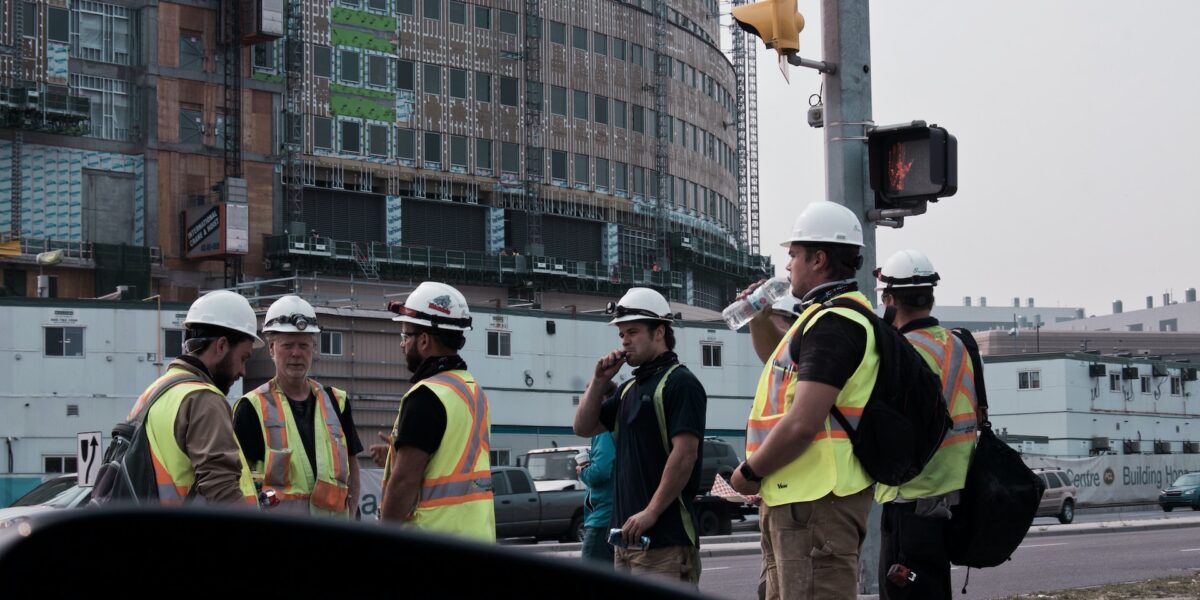From flooding in Nova Scotia to this year’s devastating wildfire season, it is hard to ignore the effects of our changing climate. Even those who have been fortunate enough to remain “untouched” by major climate disasters may find, upon some reflection, that changes in their daily lives can be traced back to climate change.
Jobs, for example, have been forced to adapt to increasingly extreme weather conditions. They can impact factors like workload, hours, and workplace safety.
READ MORE: Climate justice as a workers’ issue and the struggle for planetary health
“It puts more pressure on the health care system,” said Angella MacEwen. MacEwen is the senior economist at the Canadian Union of Public Employees (CUPE) who also works with the union’s group on workers and climate.
Canada’s already-strained health care systems must cope with more patients coming in with heat-related injuries and illnesses, due to health and safety concerns caused by rising temperatures.
This summer, poor air quality has also resulted in many people needing medical attention.
“If we’re not increasing our capacity, that’s going to make those frontline workers’ jobs harder,” MacEwen continued.
No pay for longer hours
Other frontline public service workers are also feeling mounting pressure, MacEwen said. In many municipalities, those who work outside are finding that their workdays are changing in new and unexpected ways.
“There’s the smoke, the heat, the unpredictable weather, you know? There’s lots of thunderstorms and hail and that makes it harder for people who have to work outside,” MacEwen said. “So if you’re out collecting garbage, for example, it might extend your workday because it’s not safe for you.”
Even as unexpected weather events extend workdays, some workers do not see their wages match the hours added to their day. MacEwen pointed to the hours of unpaid work that flight attendants perform.
Flight attendants are not paid for duties performed on the ground, according to a House of Commons petition sponsored by MP Taylor Bachrach. These duties include boarding, pre-flight safety checks and ground delays.
“The pay starts when the plane backs away from the terminal,” MacEwen said. “So if there are delays where they’re sitting at the terminal because of these extreme weather events, flight attendants are working. They’re having to help get people water for much longer periods of time and they’re not getting paid.”
Reorganizing labour for climate preparedness
Part of acknowledging the climate crisis is adapting the way we live to protect health and safety. MacEwen said that it is time to reorganize work in a way that makes sense in the face of climate change.
READ MORE: After years of delays, Canada announces plan to adapt to climate change
“Would we do more work later in the day, when it’s not as hot? Would it be okay to not do work on days when it is unsafe? Would the employer be okay not doing things on certain days and doing it a different day? Can this happen without penalty for the workers?” MacEwen asked. “We need to take those types of things more seriously. What are the impacts and the stresses on people?”
Some workplaces are already making adjustments needed to accommodate workers. Sean Strickland, Executive Director of Canada’s Building Trades Unions (CBTU), said that many construction workers are starting to see changes that make work safer without compromising pay or hours.
Strickland said that it is now possible for construction workers to work later into the year as winters get warmer. Employers can accommodate hot summers by having workdays start in the cool hours of the morning. As well, worksites are more commonly providing cooling stations for heat events and more personal protective equipment when other climate events occur, such as this summer’s wildfires.
The big picture
However, accommodations are not distributed evenly across groups of workers. Non-unionized construction workers, for example, remain vulnerable as CBTU members see more accommodations rolled out.
Strickland pointed to a 2021 study from the Institute for Work and Health which found that unionized worksites have a 25 per cent lower rate of lost-time allowed injury claims. Lost-time-allowed injury claims are filed by workers who suffer a work-related injury that forces them to take time off past the day of the incident.
Improving health and safety while mitigating effects on hours and wages may help workers navigate a turbulent time. However, the end goal must go beyond reactivity, according to Strickland.
“[The] big picture around this is that severe weather events are because of the amount of carbon that we pumped into the atmosphere,” Strickland said. “We’re working hard on just transition to a more sustainable economy. If we want to mitigate the severe weather events, we need to really advance our initiatives on reducing carbon.”



